#Loochoo
Explore tagged Tumblr posts
Text
Thinking more about how the Ryukyuan archipelago is more like many ethnic-cultural groups with similar histories rather than one ethnicity. There's no perfect word but I appreciate that for now, Shimanchu has been used more frequently in place of Okinawan.
As a marginalized group within the sphere of Japan, I feel that we often lean towards seeing our own history through a rose-tinted glass. But the history of our place and space is complicated and the Ryukyuan Kingdom had acts of colonization to islands outside of Uchinaa.
I do find it frustrating that Uchinaaguchi is often referred to as “the Okinawan language” when Shimayumuta, Yambaru-Kutuba, Myaakufutsu, Yaimamuni, Shikamuni, Mēramuni, Teedanmuni, and Dunanmunui also exist? And in contemporary times, what does Uchinaaguchi standardization mean?
I can't speak to how it is in the islands but in the diaspora, I do feel that [we] Uchinaanchu don't really give as much space or conversation to other islands or don't acknowledge how Loochoo/Ryukyu/Uchinaanchu is not an identity that is accepted-used across our archipelago.
I am still in the process of learning and I am grateful to those within the community for sharing their truths, struggles and thoughts in language, identity, and history.
9 notes
·
View notes
Text
0 notes
Text
I don’t suggest supporting Rob Kajiwara. While parts of his views are for the betterment of Okinawa (Ryūkyūs/LooChoo) in relation to Japan, he also has views and opinions that are problematic. He and some of those whose opinions he has shared have been anti-black and various individuals he knows are homophobic/anti-lgbtqia. He has shown himself to talk down to other Okinawan diaspora, too, in the form of discrediting them and saying they aren’t Okinawan [for having a different opinion].
I suggest following Risako Sakai, Nozomi Nakaganeku Saito, Anne Shimabuku, Wendy Matsumura, Yuuji Koutaro and Ukwanshin Kabudan for more nuanced views of issues that impact Shimanchu in and out of the Ryūkyūan Archipeligo (and also share their opinions in English).
Nozomi recently made a Twitter post about Oppenheimer.
With the Oppenheimer movie getting all the garbage attention, unfriendly reminder that the US occupied Okinawa after WW2 and decades later "returned" it to Japan. Not only is there still an American base there, but Okinawa is an independent nation, not an Island of Japan. Neither Japan nor the US should have at any point taken control of the island.
Both governments are currently complicit in the unlawful occupation of Okinawa. Anyone who wants to learn more can check out Rob Kajiwara on YouTube, who is an Okinawan activist pressing for the return of the island to it's people.
2K notes
·
View notes
Photo
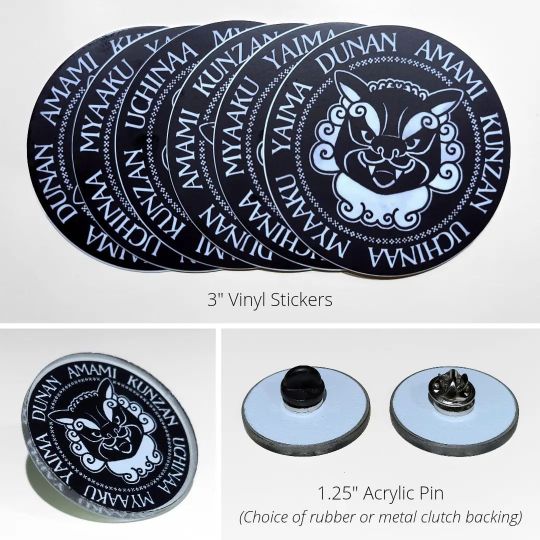
Haisai, gusuuyoo. I hope everyone is safe and doing well. I teamed up with Nami Oshiro, a fantastic Shimanchu American artist based in Virginia, to create the first three items in an ongoing effort to raise funds for independent Shimakutuba practitioners and projects.
Many Shimanchu creators and educators are doing the work on their own time and out of their own pockets, so I'm hoping that this (and future fundraisers) can be a small show of support and gratitude.
This 3" sticker, 2.25" button, and 1.25" acrylic pin set features a Ramones logo-inspired design with an open-mouth shiisaa symbolizing the sharing of good things, i.e. our indigenous languages. There are several distinct languages throughout the Ryūkyū Islands (all of which are endangered), so we decided to go with the six regions recognized by UNESCO: Amami, Kunjan (Kunigami), Uchinaa (Okinawa), Myaaku (Miyako), Yaima (Yaeyama), Dunan (Yonaguni).
Please visit the Ko‑fi shop today! All proceeds (minus item production costs and shipping fees) will be donated to individuals/groups and I'll post receipts once the donations are made.
P.S. I'm still selling items through the Shimanchu Dushi-nu-chaa Online Sale, if you're interested in combining shipping.
Shiisaa illustration by Nami Oshiro
- namioshiro.com - inprnt.com/profile/namioshiro - etsy.com/shop/iyasasa - instagram.com/nami_oshiro - twitter.com/namioshiro
#okinawa#okinawan#uchinaanchu#uchinanchu#shimanchu#ruuchuu#loochoo#ryukyu#ryukyuan#shiisaa#shisa#shimakutuba#uchinaaguchi#uchinaguchi#沖縄#ウチナーンチュ#琉球#島人#世界のウチナーンチュ#世界ウチナーンチュ#nami oshiro#art#artwork
29 notes
·
View notes
Photo




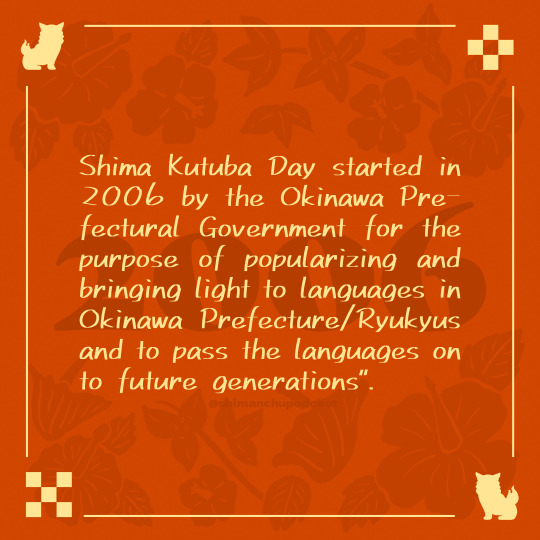

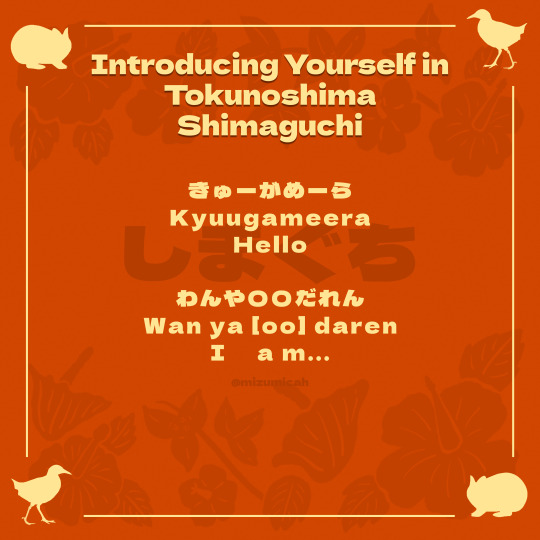

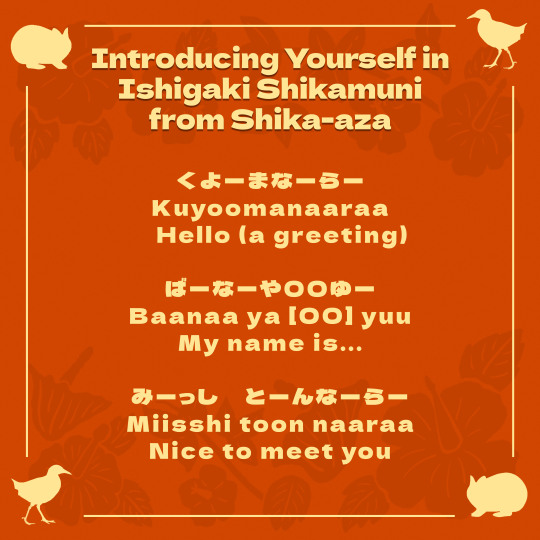

Happy Belated Shimakutuba Day which was on September 18th.
On September 18th, we celebrate the amazingly diverse languages across the Ryukyu Islands. Even within the same “language” or “town”, you’ll find different words, accents, and ways of speaking being used. Sometimes they aren’t mutually intelligible! While we included three language varieties in our post, there are many more!
A big ippee nifee deebiru to Sherry @haisai_Uchinaaguchi on IG for Uchinaaguchi, Martha @lingfieldnotes on IG for Amami Setouchi Shimaguchi and other inclusive language, Micah @mizumicah for Tokunoshima Shimaguchi, and Madoka @ooritaboori on IG for Ishigaki Shika-aza Shikamuni translations, Erica @ekunihisa for the absolutely beautiful illustration!
Side Note: Amami Island celebrates their Shimakutuba Day on February 18th! ❤️
https://www.instagram.com/p/CT-ehrZPwV_/
#shimakutuba day#okinawa#ryukyuan#loochoo#ryukyu#okinawan#shima#shima kutuba#shimakutuba#amami setouchi#shimaguchi#shikamuni#uchinaaguchi#language#おきなわ#沖縄#琉球#ichariba choodee#podcast#instagram post
113 notes
·
View notes
Text
What struck me almost immediately about this anecdote was: Captain Basil Hall must have been utterly ignorant about the "peculiar" situation of the Loo Choo people, who were in fact the inhabitants of the Kingdom of Ryūkyū, better known nowadays as Okinawa. Since the islands that make up Ryūkyū are in the Northern hemisphere, they are not in the South Pacific (that would have approached Melanesia and Australia), but the North Pacific, more specifically the China Sea.

A little history on Okinawa/the Ryūkyū Islands: it was an independent kingdom that was both a vassal state to China (from the Ming Dynasty onwards, specifically 1429) and Japan (through the invasion of the Shimazu clan from the Satsuma Domain, from 1609 onwards). Long story short, it remained (semi-)automous until was annexed by the Japanese Empire during the Meiji Era in 1879.
Due to the kingdom's proximity to Confucian civilisations, the government and inhabitants of Ryūkyū naturally adopted Confucian principles. Captain Hall, who visited the capital of Ryūkyū in 1816 by the ship Lyra, seemed to view this island kingdom as some kind of pacifist haven. After doing some light digging, Hall and John M’Leod, physician on board the Lyra's fellow expedition ship the Alceste, both wrote accounts that promoted this view. As Gregory Smits describes in the The Asia-Pacific Journal article "Examining the Myth of Ryukyuan Pacifism", an article that also provided the image above:
These accounts gushed with praise over the kindness, gentleness, and intelligence of the Okinawans, whose behavior compared especially well with the alleged boorishness and arrogance of “the Chinese.” According to Hall and M’Leod, Okinawa was a land of peace and serenity. Its residents bore no weapons and its people committed no crimes. According to Hall: “We never saw any punishment inflicted at Loochoo; a tap with a fan, or an angry look, was the severest chastisement ever resorted to, as far as we could discover.”
Hall is unlikely to have fabricated his his account—M'Leod's testimony matched his. However, their accounts of "Loo Choo" was limited to what they saw, as the Ryūkyū government applied their experience in keeping a careful balance of power between their Chinese and Japanese neighbours to the Europeans. Also from the article:
One general point to bear in mind regarding the image of Ryukyu as a pacifist kingdom is that by the nineteenth century Ryukyuan officials had become extremely adept at manipulating the kingdom’s image vis-à-vis outsiders. The most important group of outsiders was Chinese investiture envoys (sakuhōshi). Let us consider the case of vice-envoy Li Dingyuan in 1800. In Shi Ryūkyū ki, Li’s detailed record of his stay in Ryukyu, he described with much enthusiasm the plot of the kumiodori play Kōkō no maki (Tale of filial piety) and concluded with an exclamation that heaven greatly rewards those who give their lives for filial piety. [...] The play was first shown to Chinese envoys in 1756. In Li’s case, just before his departure, royal envoys unexpectedly showed up with fans, incense, and other gifts. It was the birthday of his mother in China, but Li had not told anyone in Ryukyu about it. Ryukyuan officials had done their research well, and Li was most impressed by this display of filial consciousness on their part. My point in mentioning Li’s experience in Ryukyu is simply to emphasize the skill with which Ryukyuan officials worked to portray positive images to foreign visitors. In classic Confucian values, a state governed by virtue would have little or no need for coercive force. Ryukyuans presented this same general image to European visitors as well as Chinese.
As for the Ryūkyū peoples' state of military affairs, Hall seems to imply an eternal state of pacifism with his use of present tense in describing the "Loo Choo". This smacks of him trying to emphasise a sort of moral high ground to the "warmonger" Napoleon. However, it would be a complete lie to say the kingdom of Ryūkyū had neither blades nor firearms before, during, or after Napoleon's time. The article goes into great detail about the military affairs that existed before the Kingdom became a Japanese vassal state, especially the state of the artillery in the 15th century, and the Kingdom did not just appear out of thin air—it was unified through conflict and strife. Have a read if interested—it serves as a good introductory summary.
In the end, I don't think Napoleon brought Hall's tales entirely—he too came from an island state, tossed between two larger states, that had once seceded from its rulers with dreams of remaining an independent republic. Surely, if he had known the historical context of the Kingdom of Ryūkyū, he would have understood how its people felt having to live between two beasts, and the behaviours that would produce—before he gave up the dream of Corsican independence, that is.
The Emperor is baffled by islanders of the South Pacific
Having settled where Loo Choo was, he went on to enquire about the people, making some amusing comments on their peculiarities. On telling him that they had no arms, he said, "No arms—you mean no cannon, but they have muskets?" I said not only have they no cannon, they have no swords nor spears. "Ni poignards?" asked he. "No," I replied, "We never saw any kind of warlike weapon." "Mais," said Bonaparte in a loud voice and with a manner more vehement and impatient than I had seen before, "Mais sans armes comment se bat-on?"* seemingly provoked that these simple people had no means of breaking that tranquility and peace of which, as far as we know, they are the exclusive possessors. I stated to him that they had no wars, upon which he shook his head, as if the supposition were monstrous and unnatural. When told that the people of Loo Choo had no money, he begged to question the fact. I said we had seen no money and that the people placed no value upon our gold and silver coins. He paused, and looking thoughtful, repeated to himself several times, "They do not know the use of money," and then asked how we contrived to pay for the provisions which they gave us. He was apparently much struck with the liberality of these people, who supplied us with all kinds of stock, and to so great an extent, without taking any payment. He made me describe everything we received from the natives, as well as what we had given them by way of presents.
*without arms, how do they fight?

Notes of an Interview with Bonaparte at St Helena on the 13th August 1817, written by Captain Basil Hall, Royal Navy.
#basil hall#the amherst embassy to china#where... they refused to meet the emperor because they didn't want to kowtow#and then went to korea and okinawa before going to st. helena#where napoleon hears about china and gives posterity his “sleeping giant” comment#ramble#am i projecting?#napoleon bonaparte#kingdom of ryūkyū#okinawa#ryūkyū islands
34 notes
·
View notes
Photo

Couple weeks ago, an #Uchinaanchu cousin from #Brazil contacted me after finding me as a DNA match. How awesome we got to "meet" last week via Zoom.
When I got my brother to take a DNA test few years ago to aid in genealogy research of our dad’s / American family, I definitely wasnʻt expecting anyone on my mom’s / Uchinaanchu side of family to show up as matches. But Iʻve been pleasantly surprised by the #Shimanchu cousins Iʻm encountering across the #diaspora.
As I've sifted through various documents and ships’ manifests in search of possible relatives that connect us cousins, I've come across descriptions like those pictured here, which made my heart race as I felt something tug at it and my eyes widen:
"Tattoo marks on back of 2nd and 3rd finger of both hands."
"Tattoo marks on backs of all fingers of both hands..."
Hajichi.
I could almost picture their hands blessed with #hajichi, holding so many stories past/present/future - connecting their lives in Ryukyu islands and journey to new shores with our present and collective memories and all our connected roots in our beloved ʻnmarijima, across #LooChoo.
This manifest is filled with pages of passenger names almost entirely young Uchinaanchu arriving as “farm workers.”
These Shimanchu arrived in Hawai'i as #ImmigrantFarmworkers or traveled on to Mexico, US, Peru, Brazil, Argentina... Many were recruited with promises of guaranteed work, steady pay, and in some cases land or free lodging. Many would discover otherwise upon their arrivals.
My cousins are here now reaching out to each other because somehow the passengers of this ship and others that passed through these ports found ways to persevere. It is important we do our part to remember and learn from them, even if we must dig a little together now to do so.
Whenever I review ship manifests and immigration documents, I often wonder what folks thought and felt as their new home could be seen on the horizon and their future came more clearly into view...
This time, I found myself drawn to the image of these hands... what must they have carried with them on this journey?
#uchinaanchu#brazil#shimanchu#diaspora#hajichi#loochoo#immigrantfarmworkers#imigração#okinawanos#brasil#imigrantes#história#memória
75 notes
·
View notes
Text
@depresso-1esbean YOU!
youre my first victim
lucu (loochoo) is cute! um yeah
i really need to teach my friends basic indo
esp bc the urge to speak it is looming larger and larger everyday
11 notes
·
View notes
Photo
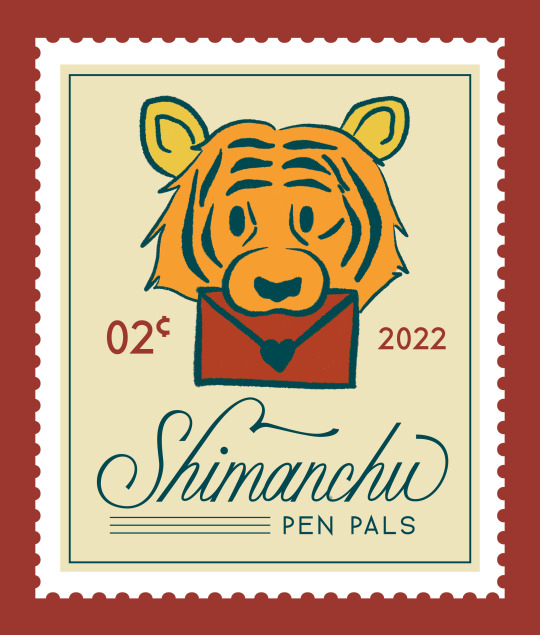
Shimanchu Pen Pals February 2022 Sign Ups are now open from Jan. 28- Feb.4! I will follow up via email with participation guidelines and the name/address of your match no later than Feb. 7th.
Sign Up Here
If you have any questions, please feel free to contact me at [email protected]!
#shimanchu#shimanchupenpals#shimanchudiaspora#okinawa#okinawan#okinawanpenpals#okinawandiaspora#okinawadiaspora#ryukyu#ryuukyuu#loochoo#Liuchiu
2 notes
·
View notes
Photo

#与那国語#与那国#与那国方言#どぅなんむぬい#Yonaguni#Yonaguni language#Dunan#Dunanmunui#Dunan-munui#Dunan language#Yaeyama languages#Yonagunijima#Ryukyu#Loochoo#Japan#Nihon#日本#Okinawa#Uchinaaguchi#沖縄#琉球
5 notes
·
View notes
Link
Okinawans call for independence at the United Nations
0 notes
Photo




The Loochoo Islands
https://www.abebooks.com/servlet/BookDetailsPL?bi=30645626572&searchurl=sortby%3D0%26vci%3D65071755&cm_sp=snippet-_-srp1-_-title1
0 notes
Photo

🔃 SHUFFLE PLAY 🔃 Weekly random selection of one traditional song and one modern song A couple of songs for the soul after yet another unthinkable tragedy and the U.S. government continuing to willfully disregard our safety. 🎶 "Sanyama Bushi" (traditional) 🎶 Rendition by Shinjin Kise Full translation below 🎶 "Warabigami" 🎶 Misako Koja Translation excerpt below Misako Koja's "Warabigami," written in 1997 affer the birth of her first grandchild, hits differently in this context. The first time I heard a mournful rendition of the song was when she performed it at a June 19, 2016 protest rally (attended by tens of thousands of Shimanchu and allies) following the murder of 20-year-old Rina Shimabukuro by American civilian contractor and ex-U.S. Marine Kenneth Franklin Gadson. Surely, Koja never imagined having to sing the song under such circumstances. ⤵️ Some translations below ⤵️ (by no means am I an expert, so apologies in advance for any mistakes!) --- 🎶 SANYAMA BUSHI 🎶 Translation from "Nufani: English Translation of Kumiodori and Okinawan Poetry," Naganori Komine: "I can't believe it's real! I'm at quite a loss. It's like the daze that comes Just after a nightmare." --- 🎶 WARABIGAMI 🎶 Translation excerpt from karakui.wordpress.com: "Though stormy winds may blow As you go through this world I will shelter you from the storm, so you may bloom like a flower Irayo hei, irayo hoi, irayo, My dearest child, Don't you cry, heiyo heiyo, May the heavens shine on you Be a good human being, heiyo, heiyo, To lead a worthy life"
5 notes
·
View notes
Photo
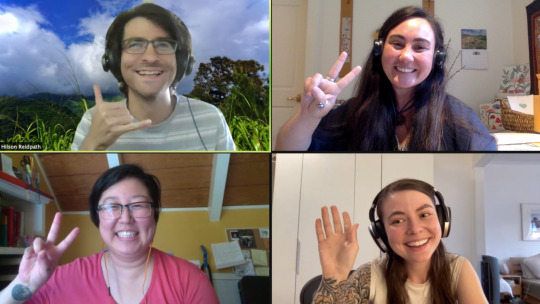
EPISODE 3 Pt.1 🌺 Hajichi with Co Lewis, June Owatari and Hilson Reidpath
Rite of passage? Protection from abduction? Markings that grant access to aspects of the afterlife? An all but obsolete cultural practice?
Join co-host Mariko with guest speakers Co Lewis, June Owatari and Hilson Reidpath as they take a dive into the Ryukyuan practice of Hajichi, or traditional Ryukyuan hand tattoo. We will look at hajichi historically, the present day hajichi revival in the United States, as well as ponder what hajichi might look like in the future.
Listen to us on:
🌟 Apple Podcasts 🌟 Google Podcasts 🌟 Spotify 🌟 YouTube (audio only)
Pt.1 https://www.shimanchupodcast.com/post/episode-3-hajichi-with-co-lewis-june-owatari-and-hilson-reidpath
Pt. 2 https://www.shimanchupodcast.com/post/episode-3-pt-2-hajichi-with-co-lewis-june-owatari
#shimanchu podcast#ichariba choodee#podcast#hajichi#okinawa#uchina#okinawan#amami#ryukyu#tokunoshima#yonaguni#miyako#ishikgaki#yaeyama#ryukyuan#loochoo#uchinanchu#co lewis#june owatari#hilson reidpath#tattoos#tattoo
7 notes
·
View notes
Text

Life is not a matter of speed but direction
GLOBAL
Tickets Open
2021 / 06 / 04
2021 / 06 / 05
Cha Eun-woo
Coming soon
CHA EUN-WOO On-line Fanmeeting [2021 Just One 10 Minute ~Into You
Afghanistan
Albania
Algeria
Andorra
Angola
Antigua and Barbuda
Argentina
Armenia
Australia
Austria
Austrian Empire
Azerbaijan
B
Baden*
Bahamas, The
Bahrain
Bangladesh
Barbados
Bavaria*
Belarus
Belgium
Belize
Benin (Dahomey)
Bolivia
Bosnia and Herzegovina
Botswana
Brazil
Brunei
Brunswick and Lüneburg
Bulgaria
Burkina Faso (Upper Volta)
Burma
Burundi
C
Cabo Verde
Cambodia
Cameroon
Canada
Cayman Islands, The
Central African Republic
Central American Federation*
Chad
Chile
China
Colombia
Comoros
Congo Free State, The
Costa Rica
Cote d’Ivoire (Ivory Coast)
Croatia
Cuba
Cyprus
Czechia
Czechoslovakia
D
Democratic Republic of the Congo
Denmark
Djibouti
Dominica
Dominican Republic
Duchy of Parma, The*
E
East Germany (German Democratic Republic)*
Ecuador
Egypt
El Salvador
Equatorial Guinea
Eritrea
Estonia
Eswatini
Ethiopia
F
Federal Government of Germany (1848-49)*
Fiji
Finland
France
G
Gabon
Gambia, The
Georgia
Germany
Ghana
Grand Duchy of Tuscany, The*
Greece
Grenada
Guatemala
Guinea
Guinea-Bissau
Guyana
H
Haiti
Hanover*
Hanseatic Republics*
Hawaii*
Hesse*
Holy See
Honduras
Hungary
I
Iceland
India
Indonesia
Iran
Iraq
Ireland
Israel
Italy
J
Jamaica
Japan
Jordan
K
Kazakhstan
Kenya
Kingdom of Serbia/Yugoslavia*
Kiribati
Korea
Kosovo
Kuwait
Kyrgyzstan
L
Laos
Latvia
Lebanon
Lesotho
Lew Chew (Loochoo)*
Liberia
Libya
Liechtenstein
Lithuania
Luxembourg
M
Madagascar
Malawi
Malaysia
Maldives
Mali
Malta
Marshall Islands
Mauritania
Mauritius
Mecklenburg-Schwerin*
Mecklenburg-Strelitz*
Mexico
Micronesia
Moldova
Monaco
Mongolia
Montenegro
Morocco
Mozambique
N
Namibia
Nassau*
Nauru
Nepal
Netherlands, The
New Zealand
Nicaragua
Niger
Nigeria
North German Confederation*
North German Union*
North Macedonia
Norway
O
Oldenburg*
Oman
Orange Free State*
P
Pakistan
Palau
Panama
Papal States*
Papua New Guinea
Paraguay
Peru
Philippines
Piedmont-Sardinia*
Poland
Portugal
Q
Qatar
R
Republic of Genoa*
Republic of Korea (South Korea)
Republic of the Congo
Romania
Russia
Rwanda
S
Saint Kitts and Nevis
Saint Lucia
Saint Vincent and the Grenadines
Samoa
San Marino
Sao Tome and Principe
Saudi Arabia
Schaumburg-Lippe*
Senegal
Serbia
Seychelles
Sierra Leone
Singapore
Slovakia
Slovenia
Solomon Islands, The
Somalia
South Africa
South Sudan
Spain
Sri Lanka
Sudan
Suriname
Sweden
Switzerland
Syria
T
Tajikistan
Tanzania
Texas*
Thailand
Timor-Leste
Togo
Tonga
Trinidad and Tobago
Tunisia
Turkey
Turkmenistan
Tuvalu
Two Sicilies*
U
Uganda
Ukraine
Union of Soviet Socialist Republics*
United Arab Emirates, The
1 note
·
View note
Photo
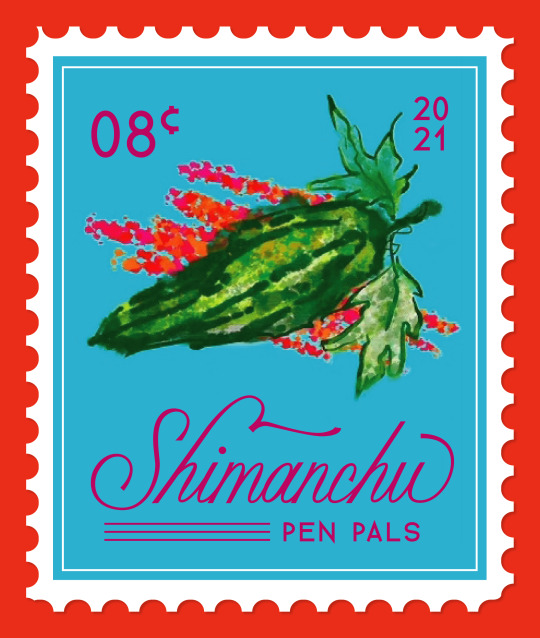
Shimanchu Pen Pals August Sign Ups are now open from July 23-July 30th! I will follow up via email with participation guidelines and the name/address of your match no later than August 2nd.
This awesome goya illustration created by Mariko Middleton <3
Sign Up Here
If you have any questions, please feel free to contact me at [email protected]!
#shimanchu#shimanchupenpals#shimanchudiaspora#okinawa#okinawadiaspora#penpals#ryukyu#loochoo#liuchiu
5 notes
·
View notes